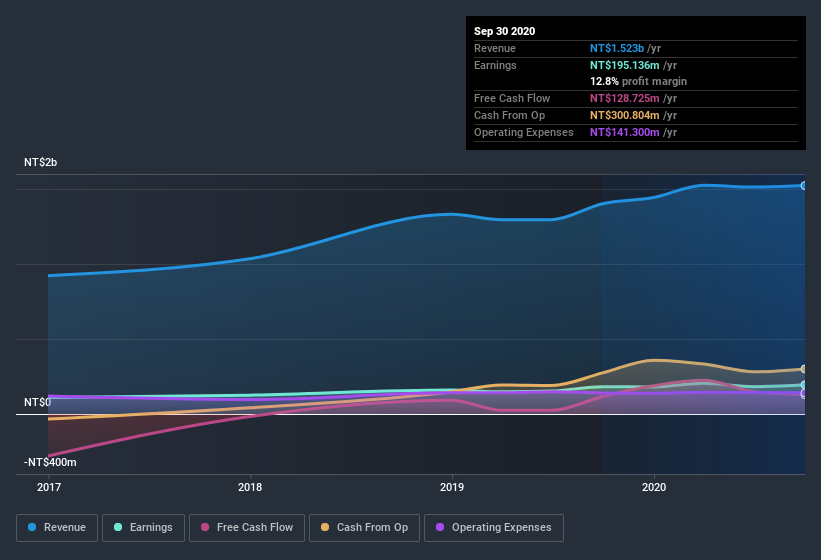Should You Use Cathay Consolidated's (TPE:1342) Statutory Earnings To Analyse It?
Statistically speaking, it is less risky to invest in profitable companies than in unprofitable ones. However, sometimes companies receive a one-off boost (or reduction) to their profit, and it's not always clear whether statutory profits are a good guide, going forward. In this article, we'll look at how useful this year's statutory profit is, when analysing Cathay Consolidated (TPE:1342).
We like the fact that Cathay Consolidated made a profit of NT$195.1m on its revenue of NT$1.52b, in the last year. One positive is that it has grown both its profit and its revenue, over the last few years.
Check out our latest analysis for Cathay Consolidated

Of course, it is only sensible to look beyond the statutory profits and question how well those numbers represent the sustainable earnings power of the business. In this article we'll look at how Cathay Consolidated is impacting shareholders by issuing new shares. Note: we always recommend investors check balance sheet strength. Click here to be taken to our balance sheet analysis of Cathay Consolidated.
One essential aspect of assessing earnings quality is to look at how much a company is diluting shareholders. As it happens, Cathay Consolidated issued 14% more new shares over the last year. That means its earnings are split among a greater number of shares. Per share metrics like EPS help us understand how much actual shareholders are benefitting from the company's profits, while the net income level gives us a better view of the company's absolute size. You can see a chart of Cathay Consolidated's EPS by clicking here.
How Is Dilution Impacting Cathay Consolidated's Earnings Per Share? (EPS)
Cathay Consolidated has improved its profit over the last three years, with an annualized gain of 60% in that time. In contrast, earnings per share were actually down by 5.5% per year, in the exact same period. And in the last year the company managed to bump profit up by 7.1%. Meanwhile, EPS was flat over the same period. So you can see that the dilution has had a bit of an impact on shareholders. Therefore, the dilution is having a noteworthy influence on shareholder returns. And so, you can see quite clearly that dilution is influencing shareholder earnings.
Changes in the share price do tend to reflect changes in earnings per share, in the long run. So it will certainly be a positive for shareholders if Cathay Consolidated can grow EPS persistently. However, if its profit increases while its earnings per share stay flat (or even fall) then shareholders might not see much benefit. For the ordinary retail shareholder, EPS is a great measure to check your hypothetical "share" of the company's profit.
Our Take On Cathay Consolidated's Profit Performance
Each Cathay Consolidated share now gets a meaningfully smaller slice of its overall profit, due to dilution of existing shareholders. Therefore, it seems possible to us that Cathay Consolidated's true underlying earnings power is actually less than its statutory profit. The good news is that its earnings per share increased slightly in the last year. At the end of the day, it's essential to consider more than just the factors above, if you want to understand the company properly. Keep in mind, when it comes to analysing a stock it's worth noting the risks involved. In terms of investment risks, we've identified 3 warning signs with Cathay Consolidated, and understanding these bad boys should be part of your investment process.
This note has only looked at a single factor that sheds light on the nature of Cathay Consolidated's profit. But there are plenty of other ways to inform your opinion of a company. Some people consider a high return on equity to be a good sign of a quality business. So you may wish to see this free collection of companies boasting high return on equity, or this list of stocks that insiders are buying.
If you’re looking to trade Cathay Consolidated, open an account with the lowest-cost* platform trusted by professionals, Interactive Brokers. Their clients from over 200 countries and territories trade stocks, options, futures, forex, bonds and funds worldwide from a single integrated account. Promoted
New: AI Stock Screener & Alerts
Our new AI Stock Screener scans the market every day to uncover opportunities.
• Dividend Powerhouses (3%+ Yield)
• Undervalued Small Caps with Insider Buying
• High growth Tech and AI Companies
Or build your own from over 50 metrics.
This article by Simply Wall St is general in nature. It does not constitute a recommendation to buy or sell any stock, and does not take account of your objectives, or your financial situation. We aim to bring you long-term focused analysis driven by fundamental data. Note that our analysis may not factor in the latest price-sensitive company announcements or qualitative material. Simply Wall St has no position in any stocks mentioned.
*Interactive Brokers Rated Lowest Cost Broker by StockBrokers.com Annual Online Review 2020
Have feedback on this article? Concerned about the content? Get in touch with us directly. Alternatively, email editorial-team (at) simplywallst.com.
About TWSE:1342
Cathay Consolidated
Operates as a contract manufacturer of technical fabrics and finished goods in Taiwan.
Flawless balance sheet second-rate dividend payer.
Similar Companies
Market Insights
Community Narratives


Recently Updated Narratives

Astor Enerji will surge with a fair value of $140.43 in the next 3 years

Proximus: The State-Backed Backup Plan with 7% Gross Yield and 15% Currency Upside.


A case for for IMPACT Silver Corp (TSXV:IPT) to reach USD $4.52 (CAD $6.16) in 2026 (23 bagger in 1 year) and USD $5.76 (CAD $7.89) by 2030
Popular Narratives


MicroVision will explode future revenue by 380.37% with a vision towards success


NVDA: Expanding AI Demand Will Drive Major Data Center Investments Through 2026



